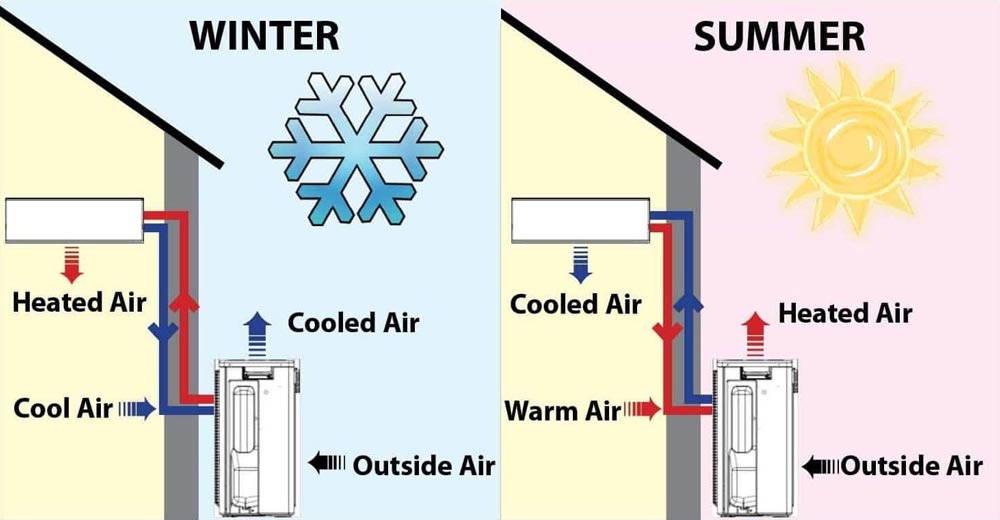Leonard Splaine Heat Pumps Service & Installation in Northern Virginia Since 1967
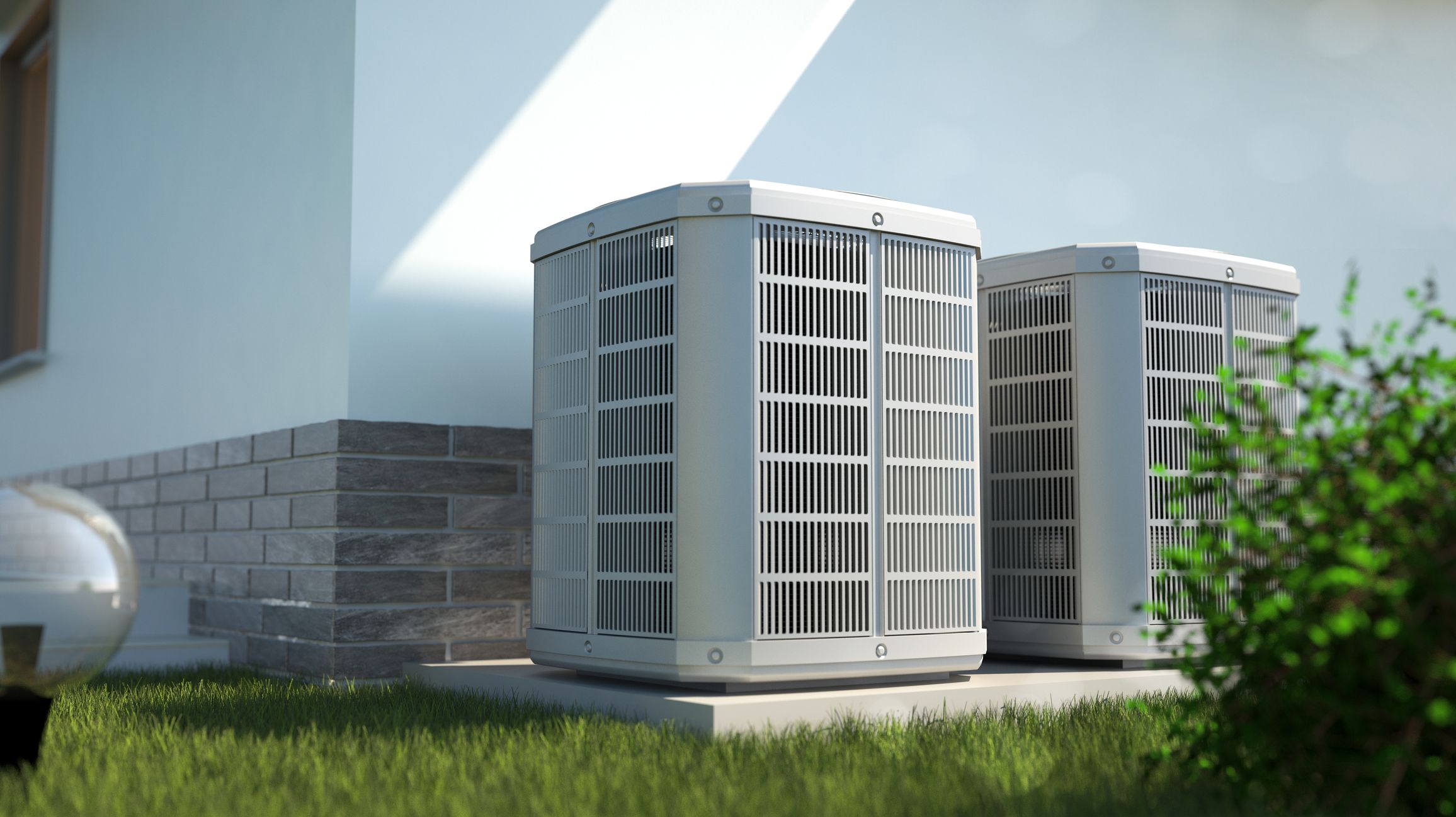
What is a Heat Pump?
Heat pumps are a machine that transfers heat from an area of cool air (called a “heat sink”) to an area that is warmer. The most obvious application for this is to remove heat from the air outside of your house or office and transfer it inside as a means of heating.
If you are familiar with how air conditioning or refrigeration works, heat pumps are the same exact thing, only they can run in reverse. In fact, the term “heat pump” itself can be a bit misleading, as people often assume that it is only a means of heating a home or office, but the name actually refers to the fact that it transfers heat, not the direction it directs the heat. In actuality, heat pumps can also be run in reverse, in which case it would be air conditioning your home or office space.
Are all heat pumps air conditioners and vice versa? In theory yes, but in practice, they are not. This is just a matter of the manufacturer’s preference and the intended use of the HVAC unit.
Simply put, all heat pumps are also air conditioners, but not all air conditioners are considered heat pumps (even though from an engineering standpoint, they are).
An air conditioner is just a heat pump that is specialized for hotter weather. If an air conditioner has a reversing valve and can be used as a heater too, then the unit is referred to as “heat pumps”.
How Does a Heat Pump Work?
Heat pumps provide a cost-effective, energy-efficient alternative to traditional air conditioners and furnaces. They are able to both heat and cool a space by transferring heat rather than generating it. In cold weather, outdoor units extract warm air and push it through a refrigerant line that is connected to an indoor unit. The air is compressed, which increases the temperature, before being released into the home. For warm weather, the system works in reverse, drawing warm air from inside and expelling it outside (similar to a typical air conditioner).
One may ask where does a heat pump acquire heat from in cold weather? Actually, even when temperatures are freezing, there is still energy stored in the air and ground. (Heat energy is present provided that the temperature is above absolute zero.) Heat prefers to move from warmer items to cooler ones, thus, the refrigerant draws heat to the pumping system. Like other heating systems, heat pumps must work harder when it is really cold, which will be reflected in the amount of energy consumed (and in your electricity bills).
Generally, the amount of heat energy discharged by a heat pump is much higher than the amount of electricity used to run it. For instance, the coefficient of performance (COP) of the typical home heat pump is normally close to four, meaning the energy output is four times greater than the electrical input. This makes the current models three to five times more efficient than the traditional gas boilers or furnaces. Additionally, heat pumps can be combined with other heating systems, such as gas, in hybrid systems.
Heat Pump Benefits
Installing a heat pump in your home is a cost-efficient, effective, and eco-friendly solution to meeting your heating and hot water requirements. Heat pumps harness energy from the environment to provide heating and hot water for your residence.
Heat pumps are a great way to reduce the amount of energy used for heating your home as the main source of heat is derived from the environment. Not only does this drastically cut down electricity costs, but it also helps to decrease the environmental impact of your heating.
Here are some of the benefits of using a heat pump system in your home:
Energy Efficiency
They don’t depend on fossil fuel usage to produce cool and warm air. Heat pumps can operate at high efficiency levels even in cold temperatures. Just 25% of the energy used by a heat pump is provided by electricity, with the remaining 75% being generated by the environment through the ground, water or air (depending on your type of heat pump system). This means that consumers will use less gas and electricity with heat pumps compared to other systems, as well as less money. Of course, this will help reduce greenhouse gas emissions, taking the pressure off both the planet and your budget.
Extremely Quiet
Heat pumps are much quieter than traditional air conditioners, with specially engineered designs to generate minimal sound when in operation. If the noise from your current AC is getting on your nerves, you may want to consider replacing it with a heat pump for a more peaceful environment.
No Emissions
Heat pumps utilize electricity (including renewable sources such as solar energy) and generate no pollutants, thus making them far more eco-friendly than conventional heating systems. They can also help improve your home air quality by filtering it and dehumidifying the surrounding environment. Good air quality inside is significant in preventing sickness and other health complications.
Requires Only One System
Heat pumps offer a great advantage in that they provide both heating and cooling in one system, making them the ideal choice in mild climates. This two-in-one system eliminates the need to buy a furnace and an air conditioner separately, thus saving you money.
Requires Only One System
Heat pumps offer a great advantage in that they provide both heating and cooling in one system, making them the ideal choice in mild climates. This two-in-one system eliminates the need to buy a furnace and an air conditioner separately, thus saving you money.
Minimal Maintenance
An attractive aspect of heat pumps is that they have a robust design and very few moving parts meaning that they don't need a lot of upkeep. A yearly system assessment is essential, but not entirely required, so no need to spend money on paying an expert. This is beneficial for homeowners looking to save money in the long haul.
Long Service Life
Heat pumps are typically expected to last around twice as long as a conventional domestic boiler, with an average lifespan of 20-25 years compared to 10-12 years for boilers.
Controllable
Heat pumps can be part of a home's climate control system and can be seamlessly connected to different control systems, including those for smart homes.
No Need for Fuel Storage
A heat pump eliminates the requirement for combustible fuels to be brought to and stored at a residence; a frequent issue for homes located in areas where natural gas is unavailable and alternative fuels, such as oil, are used.
Low Running Costs
Low running costs can help to reduce household energy bills.
Sustainable
Making use of natural energy sources like air, land, and water means a very environmentally friendly way of heating, cooling and providing hot water.
Looking for a New Heat Pump or Need to Service Your Heat Pump?
Are you interested in heat pumps and how they can change your home or office environment for the better or do you need your heat pump repaired or serviced? Then give our team of experts at Leonard Splaine a call today. We will find the best solution for your needs!

Signs Your Heat Pump Needs Repair
Since heat pumps run pretty much all year long to both heat and cool your home, the non-stop wear and tear will eventually lead to problems.
If you observe any strange noises or odors, rising energy costs, inconsistent indoor temperatures, or short running cycles, it is likely that your heat pump is not operating correctly.
Contact our team immediately if you notice any of these indicators:
Making Strange Noises
If you hear any strange noises, such as grating, clicking, or other abnormal sounds, coming from your heat pump, it is important to get it checked out and repaired as soon as possible before the issue gets worse. It is possible that the issue is minor, such as a loose screw on the cover, but strange noises often point to a more serious problem. The two common noise you may experience are:
Rattling noises – These are indicative of loose parts.
Squeaky noises – These are indications that there is an issue with the pump.
Unusual Smells
Your heat pump needs immediate attention if the air coming out of the appliance smells off. Musty or rotting smells are a concern due to the implication of mold formation or an animal making its way inside your unit. Any sort of burning smell is something you should immediately act on due to potential fire hazard. A burning smell typically indicates there is something wrong with your heat pump electrically, which can quickly become dangerous. If you do smell burning coming from your unit, turn it off immediately and don’t turn it back on until an HVAC professional has examined it and fixed any problems.
Uneven Heat Distribution
When a heat pump is not distributing warm air evenly, it is typically a sign that the air filter is blocked. A buildup of dirt and dust can reduce the flow of air, leading to certain areas and rooms not receiving a sufficient amount of heat.
No Heat or Cool Air
If the thermostat is set to the correct temperature but the heat pump is not producing the expected hot air, the problem could be related to the vent cover, evaporator coils, air ducts, or air handler. Fortunately, our specialists are prepared to replace any of these components with the correct parts that are suitable for the particular make and model of your heat pump.
Short Cycling
If your heat pump is short-cycling or frequently turning on and off, you could be dealing with a clogged filter, thermostat issue, defective fan, or faulty valves. Let our specialists assess the situation!
Increased Energy Costs
Without adequate upkeep, the performance of a heat pump can deteriorate over time due to the buildup of dirt, dust, and corrosion. This may result in a marked increase in your energy costs.
What Causes a Heat Pump to Stop Working?
A variety of complications can lead to a heat pump not functioning properly, such as thermostat difficulties, incorrect fan settings, blocked vents, broken belts, soiled coils, and clogged filters.
Thermostat or Power Issue
A fully functioning thermostat is a necessary component of any heat pump. It provides instructions to the heat pump on what temperature to maintain. When the thermostat loses power, it is unable to communicate with the heat pump and thus the pump will not start up. If the thermostat's display is not active, it is a sign that it has no power. Make sure to replace batteries or for hardwired models, check the home's electrical panel. The circuit breaker may have tripped or there could be a blown fuse. You can identify and replace a blown fuse yourself, but it is important to switch off the power before doing so. You may also need a professional to check your electrical panel or reprogram the unit.
Improper Fan Settings
Improper fan settings can result in too much or not enough warm or cold air. We advise making sure the thermostat is set to AUTO rather than ON. The blower motor in your heat pump will run constantly if left on, even in between cycles.
Dirty Coil or Fan
A heat pump's coils will eventually acquire dirt, grit, and grime. The accumulation that results from too much time without coil cleaning can prevent the heat pump from distributing heat or operating at all. Every few months, we advise hiring a specialist to clean the coil on your heat pump. Inappropriate fan settings can result in an excess or shortage of warm or cold air. We advise ensuring that AUTO, not ON, is selected for the thermostat setting. Your heat pump's blower motor will run constantly if left on, even in between cycles.
Broken Belt
If the blower on your heat pump is operating, but the motor isn't, the connecting belt may be damaged. Belt problems may be examined, accurately identified, and inexpensively fixed by our specialists.
Clogged Filter
A heat pump may cease to function as a result of a clogged air filter. Insufficient ventilation might cause the system to overheat and shut down. If your filter is clogged with debris, we advise replacing it as soon as possible with a new filter.
Loose Parts
As the unit cools/contracts and heats/expands, noises are frequently heard since heat pumps are primarily built of metal. But if your heat pump is severely rattling, there might be some loose pieces. If any parts need to be tightened, we can inspect your unit.
Is it Worth Repairing a Heat Pump?
Replacing a heat pump is usually the more economical option when the costs of repairing it exceeds a certain point or when you often find yourself repairing your heat pump. However, if the cost of repairing is still within reasonable limits, we suggest that you repair the heat pump rather than replace it. So here are instances where we believe your heat pump is still worth repairing.
- Under 10 years old
- In need of an inexpensive repair
- Just dirty, noisy, or smelly
- Covered by a warranty/HVAC service contract
It is also prudent to weigh the possibility of the likelihood of future repairs. If you’d like more detailed feedback on your specific heat pump, contact one of our professional HVAC technicians today.
How Much Does a Heat Pump Repair Cost?
The cost of fixing a heat pump depends on the nature of the problem, the kind of heat pump you have, and the degree of damage. After evaluating the problem and figuring out the necessary repair steps, we will give you a free upfront cost estimate without any extra costs.
How Many Years Does a Heat Pump Usually Last?
The expected lifespan of a heat pump is typically between 10 and 15 years, but this can be extended by making sure the system is serviced regularly. Regular maintenance such as changing air filters, cleaning the evaporator coils and checking the refrigerant levels can help to keep the heat pump running efficiently for an extended period of time.
Signs Your Heat Pump Needs to be Replaced
Replacing a heat pump when it is more than 10 years old is often a prudent choice due to potential safety risks, rising energy costs, expensive malfunctions, and imminent breakdowns. If you continuously experience any of the following signs below then we strongly advice that you consider replacing your heat pump.
Frequent Repairs
As time passes, your heat pump can suffer from natural wear and tear, necessitating regular repairs. With these repairs becoming more frequent, the costs can soon add up. Eventually, it will make more financial sense to replace the unit entirely.
Higher Energy Bills and Costs
Have you noticed your energy bills skyrocketing lately? If you’re not doing anything different, but your bills keep going up, that means your heat pump isn’t using energy efficiently.
The decreasing efficiency of a heat pump can lead to an increase in electricity usage; as it works harder and runs for longer periods of time to satisfy the thermostat's requirements, the amount of power consumed will rise. So if you notice an uptick in energy consumption and there’s no other plausible cause, your heat pump may be the reason for this high monthly utility bills. Upgrading to a new system can significantly lower your electricity expenditure.Making Unusual Noises
It is normal that you will naturally grow accustomed to your heat pump’s typical operating noises. Nevertheless, if you suddenly begin to hear strange or loud and alarming noises, you should have a professional troubleshoot the issue. It could be a sign it needs replacing.
Constantly Running
It is possible that the thermostat, electrical panel, or fans may be the cause of your heat pump not shutting off. An incessant heat pump can make your home feel uncomfortable. We will act promptly to take care of this problem to the best of our ability.
Uneven Heat Distribution
If your heat pump is not providing adequate heating and cooling for your home, have one of our experienced technicians take a look. It's possible that the uneven heat distribution is the result of normal wear and tear. Replacing the heat pump could help you save on electricity bills and also increase your comfort.
Safety Issues
If your heat pump has a carbon monoxide leak, it could pose a serious health issue for you and your family. If your unit is suffering from a leak, it’s time to get the system replaced to protect you and your loved ones.
How Much Does it Cost to Replace and Install a New Heat Pump?
When a heat pump malfunctions or runs inefficiently, it can cause substantial financial and comfort losses. Attempts at repairs may offer a short-term solution, however, replacing the heat pump may be the only long-term answer. Understandably, many people doubt they can afford a replacement and struggle to find credible information – including labor costs – online. We’re here to fix that.
The cost of changing out a heat pump can be between $4,900 and $12,500, which includes the cost of the equipment, labor, and additional expenses. This amount is dependent on the system size, complexity, and if the system is a variable-capacity heat pump system.
The following are some of the factors can affect the price of replacing or installing a new heat pump:
- The make and model of the heating unit
- The size, efficiency, and power capacity of the system
- Additional HVAC parts and equipment required for installation
- The complexity of the installation
- Labor costs
- Tax credits/rebates
Can I Install a Heat Pump Myself?
Do-it-yourself heat pump installation may be theoretical possible, but the risks and the complexity of the task make it an unwise choice.
To install a heat pump successfully, research, training, and education are needed, as well as high-grade tools and heavy-duty equipment. If you take any shortcuts or make mistakes, it can lead to a messy, dangerous and/or catastrophic result, making all your effort worthless. To avoid the hassle and complications that come with installing a heat pump, hire experienced HVAC professionals to get the job done right.

Our 100% Satisfaction Guarantee
We're so confident you'll find us to be a company you can rely on for all your heating and air conditioning needs that we guarantee your complete satisfaction! Contact us today and experience the difference for yourself.
Top 5 Heat Pump Manufacturers and Systems
As said earlier, heat pumps are an all-in-one heating and air conditioning system. We looked at several factors and features of each brand to help you make an informed purchasing decision.
Let's now take a look at the heat pump manufacturers in the United States.
Lennox
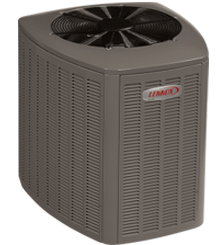
Lennox heat pump
Lennox offers one of the most precise and efficient heat pumps you can buy. It has innovative heat pumps that offer technological features, the brand owns all its own parts which can make it difficult to repair. In order to keep your Lennox heat pump running efficiently, you’ll need to properly maintain your system. That means cleaning the coils and blower parts, changing the air filter monthly, keeping the outdoor coils clean, sealing any leaks in the ducts, lubricating the motors, inspecting the belts for tightness and wear, checking the refrigerant, and making sure the thermostat is operating properly.
Trane
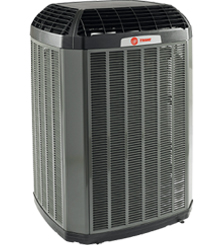
Trane heat pump
Trane offers high-quality heat pumps that will save you money. This brand was rated most efficient in 2019 by Energy star. According to Trane, there are several things you can do to properly maintain your heat pump unit through the years. Those things include keeping the registers open, cleaning or changing your filters at least once a month (or as needed), removing foliage from around the outdoor unit, elevating your unit about four to eight inches above the ground to allow for appropriate drainage, and cleaning the outdoor coils.
Carrier
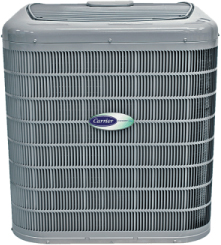
Carrier heat pump
This brand is known for its environmentally friendly heat pumps. With many technological features, this brand offers high quality, energy-efficient heat pumps. Carrier heat pumps are some of the most durable, environmentally friendly, and energy efficient in the HVAC industry. Carrier heat pumps come with a range of specialied features, like Greenspeed Intelligence, optimal humidity and temperature control, variable-speed compressor operation for ultimate quiet and comfort, compressor sound blanket, and Silencer System II design, WeatherArmor Ultra protection, non-ozone depleting Puron refrigerant, and Ideal Defrost heating operation with Infinity control.
Rheem
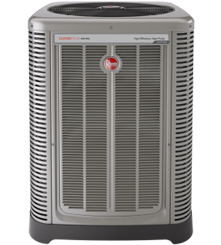
Rheem heat pump
With heat pumps that are great for residential and commercial settings, Rheem offers energy-efficiency and many types of features. Rheem heat pumps can deliver quiet, efficient heating and cooling. To keep your Rheem heat pump in good working condition, you should check the air filters every month, keep the outdoor coils clean, and inspect the blower, filters, ducts, and indoor coil for obstructions and dirt.
Goodman
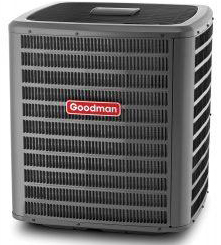
Goodman heat pump
Goodman heat pumps have a good reputation as a mid-range brand, and while reliable, other top-name brands may be more reliable. Goodman heat pumps require that homeowners schedule a professional tune-up for their central heating and cooling system at least once a year. Heat pumps should be maintained by inspecting the fan, indoor coils, outdoor coils, compressor, fan, and refrigerant lines.
Heat Pump Installation, Maintenance and Repair by Highly Trained and Reliable Heat Pump Technicians
 Leonard Splaine employs only highly qualified HVAC technicians have been through extensive training and possess a wealth of hands-on experience. Our NATE certified technicans have earned vocational degrees, have extensive trade backgrounds, and have undergone many years of rigorous training.
Leonard Splaine employs only highly qualified HVAC technicians have been through extensive training and possess a wealth of hands-on experience. Our NATE certified technicans have earned vocational degrees, have extensive trade backgrounds, and have undergone many years of rigorous training.
Leonard Splaine has the highest quality service for your Heating, Cooling, Plumbing, and Electrical systems. Get a reliable, competitive estimate that ensures you and your home are in the best hands. Our highly qualified tech teams are capable of handling all of your maintenance and repair needs.

We Are the Expert Solution to All Your HVAC & Home Comfort Needs
Take it from our customers: we solve problems and deliver solutions like no other HVAC company can. Contact us today!

